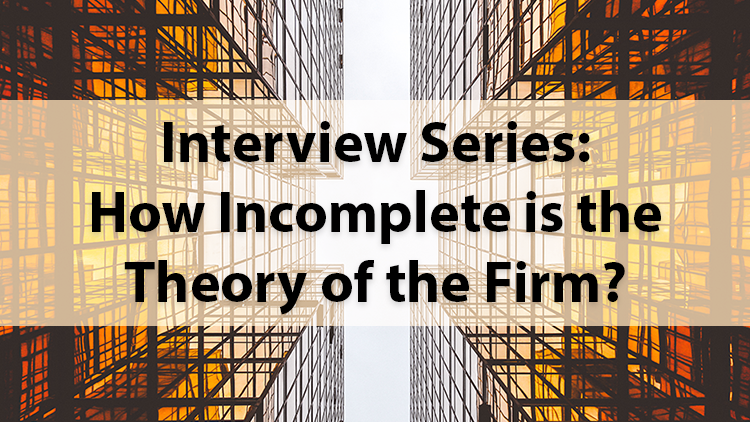In this installment of ProMarket’s interview series on the economic theory of the firm, we ask Stanford professor Anat Admati about the role of corporations and governments in the market.
On March 3-4, the Stigler Center at the University of Chicago Booth School of Business, along with Harvard Business School and Oxford University, hosted a conference in Chicago to answer the following questions: Should the economic theory of the firm be modified? And if so, how?
The standard (economic) theory of the firm is silent on the role firms can play in shaping the rules of the game under which they operate. In reality, many firms lobby politicians and try to capture regulators in order to modify the rules of the game in their favor. Some scholars have argued that the resources devoted to these activities are relatively so small that they are likely to have insignificant effects, and/or that regardless of how much firms invest in political activities, in a well-functioning democracy there are countervailing forces that effectively level the playing field. Other scholars have noted that the resources firms devote to shaping the rules of the game to their own advantage are sufficiently large and their effects sufficiently important to warrant a rethinking of the standard economic theory of the firm. Which of these two views has more empirical support? If the latter, should the economic theory of the firm be modified? If so, how, and is the potential fix better or worse than the existing problem?
The following interview with Anat Admati is part of an interview series with influential scholars who are addressing these issues in their work. You can view all previous installments here.

Anat Admati is the George G.C. Parker Professor of Finance and Economics at the Stanford Graduate School of Business. She has written extensively on information dissemination in financial markets, trading mechanisms, portfolio management, financial contracting, corporate governance and banking, and, most recently, financialization and the political economy of corporations.
Since 2010, Admati devoted much of her efforts to financial regulation. She began with a paper that gained considerable attention, “Fallacies, Irrelevant Facts, and Myths in the Discussion of Capital Regulation: Why Bank Equity is Not Socially Expensive,” (written with Peter DeMarzo, Martin Hellwig, and Paul Pfleiderer). Then came the 2013 best-selling book The Bankers’ New Clothes: What’s Wrong with Banking and What to Do About It (Princeton University Press), which Admati co-wrote with Martin Hellwig. In a March 2013 article for the Wall Street Journal, John Cochrane wrote that “Ms. Admati and Mr. Hellwig, top-notch academic financial economists, do understand the complexities of banking, and they helpfully slice through the bankers’ self-serving nonsense. Demolishing these fallacies is the central point of The Bankers’ New Clothes.”
In 2014, Admati was named in Time magazine’s list of the 100 most influential people as well as in Foreign Policy’s list of 100 global thinkers. In a brief interview with ProMarket, Admati spoke about political engagement by corporations.
Q: The neoclassical theory of the firm does not consider political engagement by corporations. How big of an omission do you think this is?
It is a major omission. Modern corporations have significant freedoms (which often expand through the courts) and numerous contact points with governments. Governments can tax or subsidize corporations or interact with them as customers, competitors, or investors. Most importantly, of course, governments ultimately set and enforce the rules that constrain and/or protect individuals and institutions. Political engagement by corporations matters greatly if corporations have a significant effect on government actions.
Even in well-functioning democracies, those acting on behalf of the governments may collude with those who control corporations to benefit themselves, and the bargains they strike may not be best overall. Actions by corporations, often taken in the name of “shareholder value,” can result in corporations extracting excessive rents and subsidies or getting away with fraud and deception. The dispersed public, particularly when the issues are complex, may be unable to hold those in governments accountable.
Q: To what extent is political engagement by corporations responsible for the current populist discontent?
The sense that the economic and political system is “rigged” and the public discontent and anger relate directly to the failure of governments to address inequality, concentration of power, and other distortions. Political engagement by corporations, including lobbying, campaign contributions, and other tactics that can create confusion and cause policymakers to yield to narrow interests has contributed to this situation. A 2015 book by Lee Drutman (The Business of America is Lobbying: How Corporations Became Politicized and Politics Became More Corporate ) shows that this phenomenon has gotten worse in recent years. While he focuses on the U.S., the issues are similar elsewhere.
Q: The World Economic Forum has called for “reimagining” and “reforming” capitalism. To what extent is this need for reform the result of disruption brought by technological change, globalization, and immigration and to what extent is it the effect of rent-seeking and regulatory capture?
The impact of technological change, globalization, and immigration on
society depends on how the relevant institutions manage these developments. Capitalism has worked poorly in recent years because governments mishandled the challenges of technological change and globalization, and that failure is related to rent-seeking and regulatory capture. The elites who engage with each other through the World Economic Forum and elsewhere can become out of touch and blind to reality; you can see the problem from Steve Schwarzman of Blackstone saying in Davos in 2016 that he found public anger “astonishing.”
Acemoglu and Robinson argued in Why Nations Fail: The Origins of Power, Prosperity, and Poverty that “man-made political and economic institutions… underlie economic success (or lack of it).” Technological developments have highlighted the immense power associated with controlling information. The business of investigative reporting is in a crisis. Corporations often play off governments, shopping jurisdictions and making bargains. For capitalism to work, the relevant institutions must work effectively and avoid excessive rent extraction. The governance challenge of the global economy is daunting.
Here are a few examples: Trade agreements have rightly sought to prevent expropriation of assets by governments, but corporations have recently used “investor protection” to try to prevent governments from protecting their citizens. For example, tobacco companies challenged Australia and Uruguay after effective anti-cigarette campaigns. The adjudication of such disputes relies on opaque tribunals of private lawyers where governments cannot sue or appeal on behalf of citizens.
Another common phenomenon is governments protecting corporations in their own jurisdiction in dealing with other governments or other corporations. The distinction between the interests of “their” corporations and the interests of dispersed citizens that governments should focus on becomes blurred for those involved, and narrow interests often win over broader interests. The opacity of shell corporations and poor design of regulations in areas where the issues are not salient to the public illustrate the issues. Martin Hellwig and I discuss “global competitiveness” and the particularly harmful symbiosis between banks and governments in our book The Bankers’ New Clothes: What’s Wrong with Banking and What to Do about It. As I discuss in the paper “It Takes a Village to Maintain a Dangerous Financial System,” many are involved in enabling recklessness by corporations in the financial sector.
Q: Some people describe Donald Trump’s economic policies as “corporatism.” Are you more worried by Trump’s interference in the market economy or by companies’ ability to subvert markets’ rules?
Donald Trump seems on path to exacerbate the trend towards crony capitalism. In his inaugural speech he complained that “a small group… has reaped the rewards of government while the people have borne the cost,” but there is little sign that he intends to get at the root of government failure. His refusal to resolve his massive conflicts of interest, his attitude to regulations, and the appointment of a large number of corporate executives to powerful policy positions are ominous.
Viewing all regulations as costly, the president forgets why we have rules in the first place and whose costs and benefits should matter. It is “costly” or inconvenient for robbers to avoid robbing or for tax evaders to pay taxes, but it does not follow that we should allow robbery or tax evasion. In directing agencies to eliminate two rules for each one put in place, the president highlights the number of rules, when it is their content and effectiveness that matters. The rules of football occupy 70 dense pages and one badly designed regulation, or no regulation at all, may kill.
Having ridden public anger to power, Trump and those around him divert anger towards real and fictional enemies within and abroad while turning the U.S. into an isolated oligarchy. I am concerned that corporate fraud and recklessness, pollution and rent extraction will get worse.






